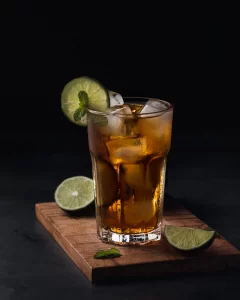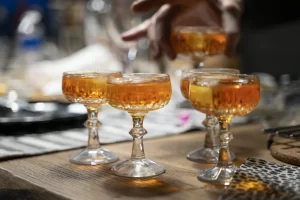Connecticut Liquor Laws and Regulations
Starting a distillery can be an exciting and rewarding venture, but navigating the complex web of liquor laws and regulations can be overwhelming for first-time entrepreneurs. In Connecticut, setting up a distillery requires compliance with a variety of state and federal laws, including licensing requirements, production restrictions, labeling guidelines, and distribution rules. This article will provide an overview of Connecticut liquor laws and regulations that are relevant to starting a distillery in the state.
Why Start A Distillery?

Starting a distillery can be an incredibly rewarding experience, offering a unique opportunity to create high-quality spirits and share them with the public. Distilleries often form the backbone of their local community, providing jobs and economic benefits while showcasing the unique character of their region.
The craft spirits industry is growing rapidly, offering potential entrepreneurs a chance to get in on the first floor of an exciting and dynamic industry. With the right combination of passion, dedication, and hard work, starting a distillery can lead to great success.
What Is A Liquor License?
A liquor license is an official permit issued by the state or local government that allows businesses to sell, manufacture, and/or distribute alcoholic beverages. Liquor licenses are typically categorized by types of business activity, such as package stores, restaurants, bars, and catering operations.
Depending on the type of license you seek, specific qualifications may be required in order to obtain a license.
For example, some states require applicants to be of a certain age or have certain professional qualifications – in Connecticut, you will need to obtain a manufacturer’s license from the Department of Consumer Protection as well as a liquor permit from the Liquor Control Division.
In addition to the above requirements, applicants must also meet any additional qualifications determined by their local municipality. For example, some cities and towns may have zoning restrictions or other regulations that limit which businesses can obtain a liquor license.
Furthermore, applicants must be able to demonstrate that they are able to comply with all applicable laws and regulations.
Licensing Requirements
Before you can legally produce and sell spirits in Connecticut, you must obtain several licenses from both the state and federal governments. The first step is to apply for a Federal Basic Permit from the Alcohol and Tobacco Tax and Trade Bureau (TTB). This permit allows you to produce, bottle, and sell spirits within the United States.
In addition to a federal permit, Connecticut also requires a state permit, obtainable from the Department of Consumer Protection (DCP), which will allow you to manufacture and sell alcoholic products in the state – you will need to apply for the right permit for your proposed endeavors, as there are different permits for the distillers of cider, beer, brew pups, farm wineries, apple brandy, and eau-de-vie.
You will also need to secure a manufacturer’s license from the Department of Consumer Protection (DCP), as well as a liquor permit from the Liquor Control Division. The manufacturer’s license allows you to produce and bottle spirits, while the liquor permit permits you to sell your products directly to consumers at your distillery or through a licensed retailer.
Types Of Permit
As mentioned, there are different types of permits depending on the alcohol that you are planning to sell, and these include:
Beer
A beer manufacturer permit limits operations to beer within the state. It allows for storage, offering, and tasting of beer on-site and free samples to visitors who have taken a tour. Additionally, it authorizes the retail sale of bottles or containers of beer not exceeding eight liters per customer, per day.
This is only applicable for off-site consumption, as containers must be tightly closed. The annual fee for a beer manufacturer permit is $800
Cider And Apple Wine
Manufacturers of cider and apple wine with an alcohol content of less than 6% and 15%, respectively, may obtain a permit from DCP upon approval of the manufacturing location.
This permit allows individuals to manufacture, store, bottle, wholesale distribute, and sell to both permittees and non-permittees within the state.
The annual fee for a cider manufacturer’s permit is $160
Apple Brandy And Eau-de-Vie
The scope of operation for a manufacturer of apple brandy and eau-de-vie is limited to those products and incurs an annual fee of $320
Farm Wineries
Farm wineries are places or premises on a farm in the state producing and selling wine.
These permittees can only make wine and brandies from grapes or other fruits, such as grappa and eau-de-vie. Licensed farm wineries cannot sell any wines or brandies not made by them, except for those produced by another farm winery in the same state.
A farm winery permit authorizes:
- The sale of wine in bulk from the premises of production by the permit holder
- The sale and shipment of wine by the permit holder to customers outside the state of Connecticut
- Any free samples to prospective customers and visitors
- Retail sale of sealed bottles, containers, or glasses of wine, to be consumed off the premises
Manufacturers with an annual production of 100,000 gallons or fewer of wine can sell and ship their products to wine retailers in sealed containers not higher than 15 gallons.
Brew Pubs
A manufacturer permit for a brew pub grants the holder the right to manufacture, store, bottle, and retail beer on-site and off-site, provided that the permit holder annually brewers at least 5,000 gallons on the premises.
Individuals are only allowed to purchase a maximum of eight liters of beer on days when retail locations can sell bottles or containers with a seal, according to the provisions found in subsection CGS § 30-91(d).
The annual fee for a manufacturer permit for a brew pub is $240
Selling Alcohol In Connecticut
Once you have obtained the necessary permits and licenses, you can begin selling your spirits in Connecticut. The state of Connecticut requires that any sale of alcohol or alcoholic beverages must be done through a licensed retailer.
This includes bars, restaurants, liquor stores, and other establishments that are approved by the Department of Consumer Protection (DCP).
You will also need to become familiar with the state’s laws and regulations regarding the sale, distribution, and labeling of alcohol.
For example, all bottles must be labeled with information including the name of the manufacturer, the brand or type of beverage, the ingredients used in production, and any health warnings. Additionally, you must adhere to
Connecticut’s pricing laws and minimum pricing requirements for alcoholic beverages.
Taxes And Fees In Connecticut
Distilleries must also pay taxes on their products. A spirits tax of $5.40 per gallon is imposed on all alcoholic beverages produced in or imported into Connecticut. Additionally, distilleries may be subject to other local and state fees or assessments.
Final Thoughts
Starting a distillery in Connecticut can be a complex process, as it requires an understanding of the various liquor laws and regulations that govern its production and sale. In order to operate legally and avoid penalties, you must obtain all necessary permits and abide by the applicable laws.
Additionally, you should familiarize yourself with the taxes and fees associated with distilling in the state. With patience and diligence, however, you can navigate the process and successfully open and operate a legal distillery in Connecticut.









